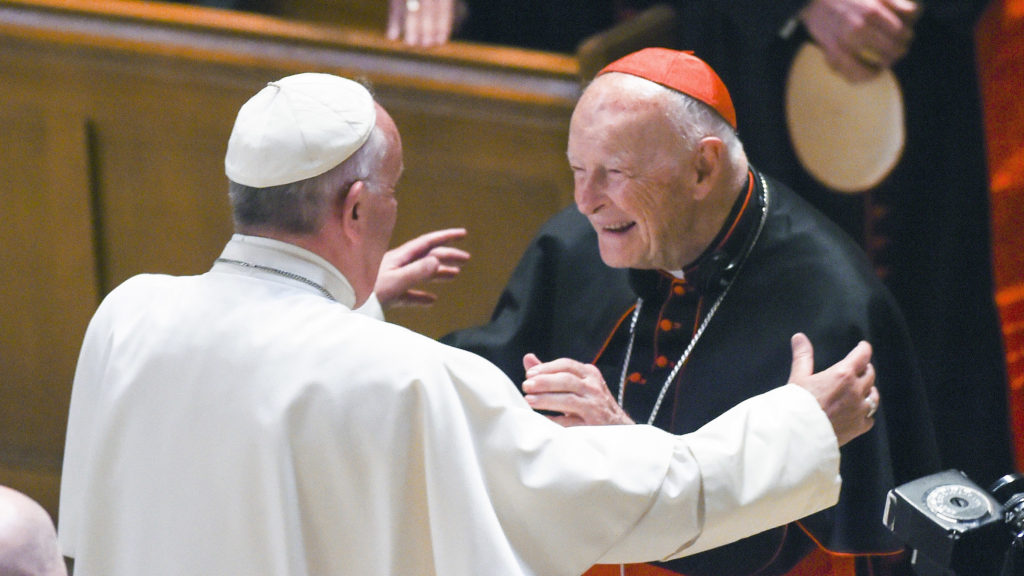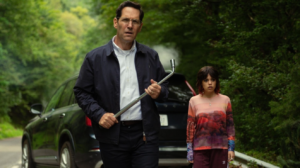Vatican Report Released, Investigates Three Popes’ Involvement in Former Archbishop McCarrick Controversy

Image Courtesy of NPR
By Katie Ward
The culmination of the Vatican’s two-year-long investigation into sexual assault allegations against former Cardinal Theodore McCarrick was published in a 461-page report on Tuesday.
The investigation found that several of the highest-ranking Church officials, including Pope John Paul II and Pope Benedict XVI, were made aware of allegations against McCarrick, proceeded to appoint him to positions, including Archbishop of Washington in 2001, and failed to investigate him during their papacies.
The report has led to conflicting reactions, from praise of the Vatican’s path towards transparency, to criticisms of the overlooking of allegations against McCarrick during three separate papacies and JPII’s fast-track to sainthood. CUA Canon Law professor Kurt Martens was quoted in a Washington Post article titled “Still Saintly?”
“The impression I got on first reading was that it was a man operating based off of incomplete information,” said Martens in the article. “You see how there is a culture of silence. I might change my mind. I don’t think you can understand the document in one reading.”
Catholic University President John Garvey emailed the university community on Tuesday morning acknowledging the Vatican report and said that the McCarrick news “hit close to home,” referring to McCarrick’s lengthy involvement at Catholic University.
McCarrick was a student (receiving his M.A. in 1960 and Ph.D. in 1963, both in sociology), Dean of Studies, chaplain, and professor from 1961-1963, and assistant to the rector and the first director of development for the university in 1963. He served on the Board of Trustees and received an honorary doctorate of humane letters in 2006.
The university rescinded the honorary degree in July of 2018 after a unanimous vote from the Board, the only time in the university’s history it has withdrawn an honorary degree.
The email included a statement from Stephen White, the executive director of the Catholic Project.
“The wounds inflicted by Theodore McCarrick upon his victims and upon the whole Body of Christ cannot be undone by one report, however thorough or transparent,” White said in his statement. “But truth and transparency are necessary steps toward healing those wounds and repairing the trust that has been broken.”
Vatican Report
Pope John Paul II appointed McCarrick as Archbishop of Washington in November 2000, even after the pope received warnings against McCarrick’s appointment, the most condemnatory of which was from New York Cardinal John O’Connor in late 1999.
O’Connor summarized allegations from a priest and anonymous letters that McCarrick had engaged in inappropriate conduct while Archbishop of Newark, in addition to knowledge that McCarrick had shared a bed with seminarians while Bishop of Metuchen and Archbishop of Newark.
After receiving the letter, in spring of 2000, Pope John Paul II requested that then-Apostolic Nuncio Gabriel Montalvo Higuera inquire about the allegations to four New Jersey bishops. The report released Tuesday stated that three out of the four bishops responded with inaccurate information related to McCarrick’s sexual conduct. After McCarrick heard about O’Connor’s letter, he wrote a letter in August to the pope’s secretary refuting O’Connor’s claims; O’Connor had passed away three months before McCarrick’s self-defense.
After the placating responses from the New Jersey bishops and the contents of O’Connor’s letter having been denied by McCarrick, Pope John Paul II announced McCarrick as the Archbishop of Washington in November 2000; McCarrick was installed in January and made a cardinal seven weeks later.
Pope Benedict XVI, who began his papacy in April 2005, extended McCarrick’s tenure in Washington by two years. The Holy See soon started to push for McCarrick to step down in 2006 and for a canonical process to begin to investigate him.
“Ultimately, the path of a canonical process to resolve factual issues and possibly prescribe canonical penalties was not taken,” the report stated. “Instead, the decision was made to appeal to McCarrick’s conscience and ecclesial spirit by indicating to him that he should maintain a lower profile and minimize travel for the good of the Church.” The report listed a lack of allegations of child abuse, McCarrick’s own denial of the allegations, and the length of time since the alleged misconduct as reasons an investigation was not initiated.
McCarrick stepped down as Archbishop of Washington in summer of 2006 but continued public ministry in the United States and abroad. Believing that Pope John Paul II had investigated fully and knowing that McCarrick was very active during Pope Benedict XVI’s papacy, Pope Francis continued the approach of the previous papacies.
In the summer of 2018, after claims that McCarrick had molested a 16-year-old altar boy were deemed “credible and substantiated,” Pope Francis requested McCarrick’s resignation from the College of Cardinals in July and called for a formal Vatican investigation in October 2018, prompted by an explosive letter published by Archbishop Carlo Maria Viganò condemning McCarrick and church leaders. McCarrick was dismissed from the clergy in February 2019.
The start of the investigation into McCarrick was preceded by the release of a Pennsylvania Grand Jury report in August 2018, which mentioned McCarrick’s Washington successor Donald Wuerl over 200 times as possibly contributing to a cover-up of clergy abuse while Bishop of Pittsburgh and led to Wuerl’s resignation two months later. The Washington archdiocese was prompted to begin its own investigation into abuse by clergy in Washington after McCarrick’s and Wuerl’s condemnations.
The conclusion of the Vatican report included a statement from Pope Francis in the August 20, 2018 “Letter of the Holy Father Francis to the People of God: “Looking back to the past, no effort to beg pardon and to seek to repair the harm done will ever be sufficient. Looking ahead to the future, no effort must be spared to create a culture able to prevent such situations from happening, but also to prevent the possibility of their being covered up and perpetuated.”
A CRUX article the day after the release of the Vatican report said that the report didn’t just break with the Church’s principles of secrecy and sovereignty, but shattered them forever.
“In the end, it’s possible the McCarrick report may be remembered as the single most consequential step toward reform during the Francis papacy, not only because of what it reveals about this particular case, but the precedent it sets for how all future cases ought to be handled,” the article said.







